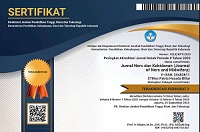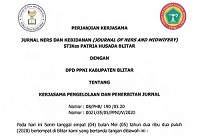Early Detection of Mental Disorders and Psychosocial Problems in Students Taking Online Learning during COVID-19 Pandemic
DOI:
https://doi.org/10.26699/jnk.v9i1.ART.p005-011Keywords:
pandemic, online learning, nursing studyAbstract
The online problems impact from online learning faced by students if not handled immediately will lead to the impact of mental disorders and psychosocial problems that are bigger and more serious. The aim of this study is to conducted early detection of mental disorders and psychosocial problems in nursing students who run online clinical practices during the COVID-19 pandemic at Tribhuwana Tunggadewi University, Malang. This research uses descriptive research with a cross-sectional study approach. That is, data between the independent and dependent variables collected at the same time. The population in this study were all students at Tribhuwana Tunggadewi University Malang, class of 2016, as many as 276 people. Sampling in this study is the total sampling technique is the overall sampling technique. This research used Chi square analytics to test the hypothesis. Result of this study shows that gender is significantly associated with psychological problems (p = 0.038), while gender has no relationship with the use of psychoactive use (p = 0.789), and PTSD (p = 0.551). It is concluded that mental disorders and psychosocial problems (i.e., psychological problem, psychoactive use, PTSD and unidentified psychologicaly) were prevalent among nursing students who run online clinical practice at Tribhuwana Tunggadewi. Students’ gender are associated with psychological problems, while has no associated with psychoactive use and PTSD. This study recommend that faculty authority, health professionals, and other professional related to mental health should play an important role for the prevention and earlier recognition of and intervention for psychosocial problems in nursing students who run online clinical practice during the COVID-19 pandemic.
References
Arini, L., & Syarli, S. (2020). Deteksi Dini Gangguan Jiwa Dan Masalah Psikososial Dengan Menggunakan Self Reporting Qustioner (SRQ-29). Jurnal Keperawatan Muhammadiyah, 5(1).
Balitbangkes, R. I. (2018). Laporan nasional Riset Kesehatan dasar (Riskesdas) tahun 2018. Jakarta: Balitbangkes RI.
Chaplin, J. P., & Kartono, K. (2019). Kamus lengkap psikologi.
Depkes RI. (2009). Profil kesehatan Indonesia 2008. Departemen Kesehatan Republik Indonesia.
Eva, E. O., Islam, M. Z., Mosaddek, A. S. M., Rahman, M. F., Rozario, R. J., Iftekhar, A. F., Ahmed, T. S., Jahan, I., Abubakar, A. R., & Dali, W. P. E. W. (2015). Prevalence of stress among medical students: a comparative study between public and private medical schools in Bangladesh. BMC Research Notes, 8(1), 1–7.
Hasanah, U., Ludiana, I., & PH, L. (2020). Gambaran psikologis mahasiswa dalam proses pembelajaran selama pandemi COVID-19. Jurnal Keperawatan Jiwa, 8(3), 299–306.
Iskandar, D. (2005). Dharmawan, dan Tim Pulih. 2005. Prinsip-Prinsip Dukungan Sosial Pasca Bencana.
Kemendikbud RI. (2020). Surat Edaran Mendikbud Nomor 36962/MPK.A/HK/2020 tentang Pembelajaran secara Daring dan Bekerja dari Rumah dalam Rangka Pencegahan Penyebaran Corona Virus Disease (COVID-19). Kementerian Pendidikan dan Kebudayaan Republik Indonesia.
Kementrian Kesehatan RI. (2019). Informasi Kementrian Kesehatan RI.(2019). Situasi Kesehatan Jiwa DI Indonesia. InfoDATIN.
Kumari, A., Singh, S. B., Mahajan, S., Sharma, V., Ranjan, R., Vohra, P., Goel, N., & Garima, G. (2020). STRESS ASSESSMENT IN MBBS FIRST YEAR STUDENTS BEFORE AND AFTER STRESS MANAGEMENT TRAINING DURING COVID-19 LOCKDOWN: A NORTH INDIAN STUDY. Studies, 8, 9.
Maulana, I., Suryani, S., Sriati, A., Sutini, T., Widianti, E., Rafiah, I., Hidayati, N. O., Hernawati, T., Yosep, I., & Hendrawati, H. (2019). Penyuluhan Kesehatan Jiwa untuk Meningkatkan Pengetahuan Masyarakat tentang Masalah Kesehatan Jiwa di Lingkungan Sekitarnya. Media Karya Kesehatan, 2(2).
Meri, H. (2020). Gambaran tingkat stres, kecemasan dan depresi pada mahasiswa universitas andalas dalam menghadapi pandemi covid-19. Universitas Andalas.
Monteiro, N. M., Balogun, S. K., & Oratile, K. N. (2014). Managing stress: the influence of gender, age and emotion regulation on coping among university students in Botswana. International Journal of Adolescence and Youth, 19(2), 153–173.
Nasir, A., & Muhith, A. (2011). Dasar-dasar keperawatan jiwa: pengantar dan teori. Jakarta: Salemba Medika.
Nurjanah, S. (2020). Emotional Mental Disorders on Clients Pandemic Covid 19 at Quarantine House. Jurnal Ilmu Keperawatan Jiwa, 3(3), 329–334.
O’Callaghan, P. (2014). The relationship of stress to gender, age, academic motivation, student expectations and self-esteem among students.
Pathmanathan, V. V, & Husada, M. S. (2013). Gambaran tingkat stres pada mahasiswa fakultas kedokteran universitas sumatera utara semester ganjil tahun akedemik 2012/2013. E-Journal FK USU, 1(1), 1–4.
Rahmayani, R. D., Liza, R. G., & Syah, N. A. (2019). Gambaran Tingkat Stres Berdasarkan Stressor pada Mahasiswa Kedokteran Tahun Pertama Program Studi Profesi Dokter Fakultas Kedokteran Universitas Andalas Angkatan 2017. Jurnal Kesehatan Andalas, 8(1), 103–111.
Takwin, B. (2008). Menjadi mahasiswa. Bagustakwin. Multiply. Com.
Downloads
Published
How to Cite
Issue
Section
License
Copyright (c) 2022 Jurnal Ners dan Kebidanan (Journal of Ners and Midwifery)

This work is licensed under a Creative Commons Attribution-ShareAlike 4.0 International License.






